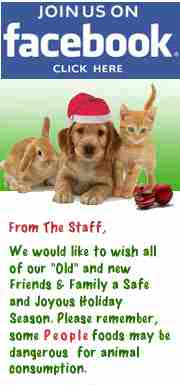
10 Feb Protecting Your Pet During the Holiday Season

During the Holiday Season, we sometimes forget that our 4-legged friends and family cannot partake of the rich foods we bring to the table. Some of us know that it not okay but as we do even with our own diets, we rationalize, “A little bit won’t hurt Rover or Kitty”. Doing so is quite dangerous.
In addition, the holiday decorations we all love so much can be deadly to small pets. Dr. Lorie Huston, author of the Pet Health Care Gazette discusses Potential Household Risks for Pets During the Holidays in the article below.
GreeniesNashville, TN –The GREENIES® Brand has partnered with veterinarian Dr. Lorie Huston, author of the Pet Health Care Gazette and veterinary expert for petMD’s The Daily Vet, to share insights about the health hazards pet owners may not be aware of for pets during the holidays and tips on how to protect against them
Holiday Havoc—The holidays can be a stressful time for pets. In many households, the holidays bring frequent visitors and major changes in the daily routine. As such, it’s important to provide pets with a private area of their own. This should be a room or area of the home where guests are not allowed.
Pets will find comfort in being able to retire to a quiet place where they can escape the hustle and bustle of the holidays. Above all, it’s important for pet owners to allow a little extra time during the holidays to pay special attention to their pets.
Poisonous Plants—Though seemingly harmless, holiday plants can be highly toxic for our four-legged friends. Poinsettia ingestion can cause mild intestinal problems for pets and irritation to the mouth and stomach. Pets that ingest certain types of mistletoe can become ill as well. Other plants like holly, amaryllis and lilies are also known to be quite toxic to pets, so make sure that when decorating the house, these items are in areas not frequented by pets or at levels pets cannot reach.
Dangerous Decorations—Items like tinsel and ribbons may be potential choking hazards for pets, and tree ornaments, usually fragile in nature, can be hazardous if broken. Water used at the base of live Christmas trees is often stagnant and may contain fertilizers or other preservatives that can upset a pet’s stomach. Lastly, curious pets can run into trouble when investigating candles or potpourri, so be sure to keep these items out of a pet’s line of sight!
Fattening Foods—While it may be tempting to share a holiday meal with your dog or cat, it’s probably best to rethink that strategy as many holiday foods can be unhealthy for pets. Things like chocolate, raisins, grapes, macadamia nuts and even onions can be toxic to pets. Xylitol-containing sweets and gums can make pets very ill, and foods with high fat content have been known to cause pancreatitis, especially in dogs. Seek out nutritious and purposeful treats when shopping for holiday goodies, like those offered by the GREENIES® Brand.
Being aware of these holiday health hazards equips pet owners with the knowledge they need to make this holiday season a healthy and safe one for pets. For more tips, visit www.greenies.com and www.lorie-huston.com.
Read more about Dr. Lorie Huston and The Nutro Company here: Veterinarians Friends.
Have additional questions about pet health and nutrition? Visit out website at GLEN BURNIE ANIMAL HOSPITAL, we are here to help anyway we can.



Sorry, the comment form is closed at this time.